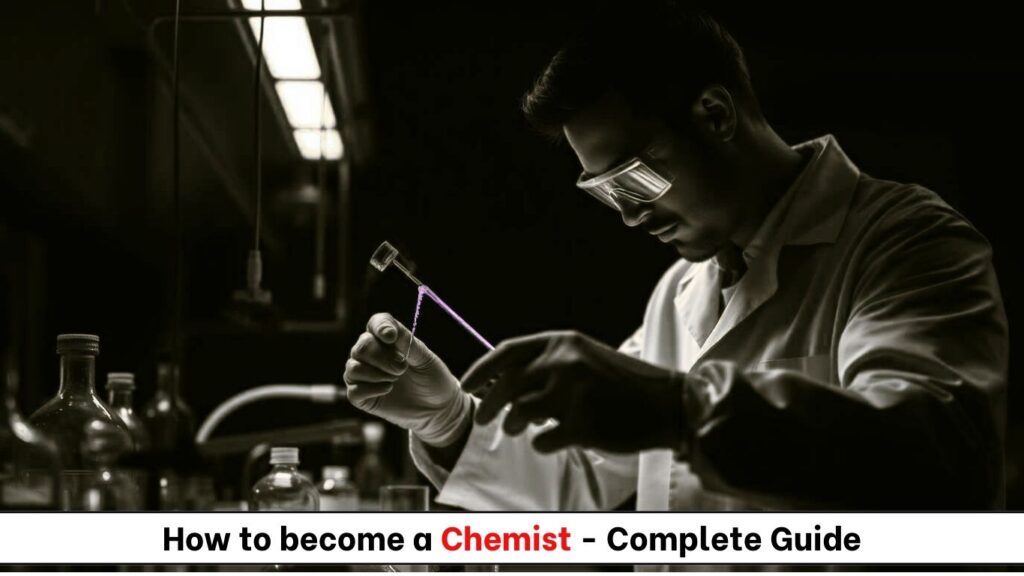
Introduction
Chemistry is often called the “central science” because it bridges physics, biology, and environmental science. A chemist is a professional who studies the composition, structure, and properties of matter to develop new materials, medicines, and technologies. From creating life-saving drugs to improving industrial processes, chemists play a crucial role in advancing society.
If you’re curious about how substances interact, enjoy lab work, or want to contribute to scientific breakthroughs, a career as a chemist could be ideal for you. This blog will cover:
- History of Chemistry
- Roles and Responsibilities of a Chemist
- Salary Expectations
- Required Qualifications & Skills
- How to Get Started in Chemistry
- Future Scope of Chemistry
Let’s explore!
History of Chemistry
Chemistry has evolved over centuries, from ancient alchemy to modern molecular science. Here’s a brief timeline:
Ancient & Medieval Chemistry (Pre-1500s)
- Alchemy: Early chemists (alchemists) tried turning metals into gold and searched for the “elixir of life.”
- Gunpowder (9th century): Discovered in China, revolutionizing warfare.
Early Modern Chemistry (1500s-1800s)
- Robert Boyle (1661): Defined elements and compounds, marking the start of modern chemistry.
- Antoine Lavoisier (1778): Discovered oxygen and formulated the law of conservation of mass.
Modern Chemistry (19th Century-Present)
- Dmitri Mendeleev (1869): Created the Periodic Table of Elements.
- Marie Curie (1898): Discovered radioactivity, winning two Nobel Prizes.
- Linus Pauling (1954): Pioneered quantum chemistry and molecular biology.
- Nanotechnology (21st century): Manipulating matter at the atomic level.
Today, chemistry is essential in medicine, energy, materials science, and environmental protection.
Roles and Responsibilities of a Chemist
Chemists work in diverse industries, with roles varying by specialization. Key responsibilities include:
1. Research & Development (R&D)
- Develop new drugs, materials, or chemical processes.
- Conduct experiments and analyze data.
2. Analytical Chemistry
- Test substances for purity, composition, and safety (e.g., food, pharmaceuticals).
- Use instruments like HPLC, GC-MS, and spectrophotometers.
3. Medicinal Chemistry
- Design and synthesize new drugs in pharmaceutical companies.
- Work on drug formulation and testing.
4. Environmental Chemistry
- Analyze pollutants and develop solutions for air/water purification.
- Work on sustainable chemical processes.
5. Industrial Chemistry
- Improve manufacturing processes (e.g., petrochemicals, plastics).
- Ensure compliance with safety regulations.
6. Quality Control & Assurance
- Monitor product quality in industries like cosmetics, food, and chemicals.
- Ensure compliance with FDA, EPA, or ISO standards.
Salary of a Chemist
Salaries depend on experience, education, and industry. Approximate figures:
| Country | Entry-Level Salary (Annual) | Experienced Salary (Annual) |
|---|---|---|
| USA | $50,000 – $70,000 | $80,000 – $120,000+ |
| UK | £25,000 – £35,000 | £40,000 – £70,000 |
| India | ₹3,00,000 – ₹5,00,000 | ₹8,00,000 – ₹15,00,000+ |
| Germany | €40,000 – €55,000 | €60,000 – €90,000 |
Pharmaceutical and petroleum industries typically offer higher salaries.
Qualifications & Skills Required
Educational Qualifications
- Bachelor’s Degree (B.Sc/B.Tech in Chemistry, Chemical Engineering, or related fields) – Essential for entry-level jobs.
- Master’s Degree (M.Sc/M.Tech in Chemistry, Analytical Chemistry, etc.) – For specialized roles.
- PhD – Required for research scientists, professors, or high-level industry positions.
Key Skills
- Lab Techniques: Titration, spectroscopy, chromatography.
- Software & Tools: ChemDraw, MATLAB, Python for data analysis.
- Soft Skills: Attention to detail, problem-solving, teamwork.
Certifications (Optional but Helpful)
- American Chemical Society (ACS) Certification
- Hazardous Waste Operations (HAZWOPER) Certification
How to Get Started in Chemistry
Step 1: Choose the Right Education
- After 12th (Science stream with Chemistry, Physics, Maths/Biology), pursue a B.Sc/B.Tech in Chemistry or Chemical Engineering.
- Top Colleges:
- India: IITs, NITs, BHU, Delhi University
- USA: MIT, Caltech, UC Berkeley
- UK: University of Oxford, Imperial College London
Step 2: Gain Hands-On Experience
- Internships: Work in labs, chemical industries, or research centers.
- Projects: Participate in university research or chemistry competitions.
Step 3: Pursue Higher Studies (Optional)
- A Master’s or PhD enhances career prospects in research and academia.
Step 4: Build a Strong Professional Network
- Join chemistry societies (e.g., ACS, Royal Society of Chemistry).
- Attend conferences and workshops.
Step 5: Apply for Jobs
- Entry-Level Roles: Lab Assistant, Quality Control Analyst
- Mid-Level Roles: Research Scientist, Process Chemist
- Senior Roles: R&D Manager, Chief Chemist
Future Scope of Chemistry
Chemistry is evolving with cutting-edge innovations:
1. Green & Sustainable Chemistry
- Developing biodegradable plastics and eco-friendly chemicals.
- Reducing industrial waste through cleaner processes.
2. Pharmaceutical Advances
- Personalized Medicine: Custom drugs based on genetic profiles.
- Nanomedicine: Using nanoparticles for targeted drug delivery.
3. Energy Solutions
- Batteries & Solar Cells: Improving energy storage and efficiency.
- Hydrogen Fuel: Clean energy alternatives.
4. Materials Science
- Smart Materials: Self-healing polymers, superconductors.
- Graphene & Nanomaterials: Revolutionizing electronics and medicine.
5. AI & Computational Chemistry
- Using machine learning to predict chemical reactions.
- Accelerating drug discovery with AI models.
Job Market Growth: The chemical industry is projected to grow by 6% annually, with high demand in pharmaceuticals, energy, and environmental science (Source: Bureau of Labor Statistics).
Conclusion
A career as a chemist offers exciting opportunities to innovate and solve real-world problems. Whether you’re developing new medicines, creating sustainable materials, or researching renewable energy, chemistry is at the heart of progress.
If you’re passionate about science, start with a strong educational foundation, gain practical experience, and stay updated with industry trends. The future of chemistry is limitless—will you be part of it?
Are you considering a career in chemistry? Share your thoughts in the comments!













Post Comment